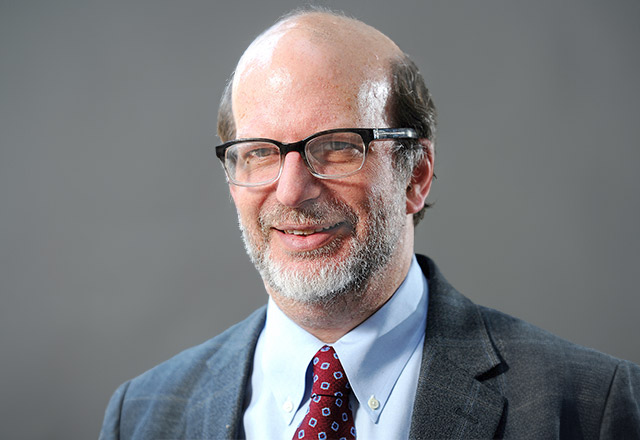From Metastatic Cancer Patient to Marathon Runner
A Bloomberg~Kimmel Institute Treatment Saves Another Life

As 37-year-old Kristina laced up her running shoes to begin the grueling 26.2-mile 2019 New York Marathon, she knew where to find the grit, tenacity and determination it would take to make it to the finish line. Baum drew her inspiration from her 7-year battle with metastatic melanoma skin cancer.
Her survival and the ability to take on a marathon are a testimony to Baum’s strength and the power of discoveries at the Kimmel Cancer Center’s Bloomberg~Kimmel Institute for Cancer Immunotherapy. Experts there researched and developed the treatment plan that not only saved Kristina’s life but did so without diminishing the strength she’d need to train and complete a marathon.
Baum’s cancer story began in 2012 when she noticed a raised bump on her arm. At 30, she was cancer was the last thing on the mind of the young and busy communications professional, who was working on Capitol Hill for the Science Commission.
“I thought cancer was an old person’s disease,” she said.
A biopsy of the bump revealed it was melanoma, and worse yet it had already begun to spread nearby lymph nodes. At the time there were not many treatments for melanoma. It was a grim diagnosis.
She received initial treatment at a community hospital near her home in Washington, D.C., but two surgeries later, she said she felt horrible and was unable to work.
I thought cancer was an old person's disease.
Kristina
 LIPSON
LIPSONIn 2016, when she learned the cancer returned and had spread to her kidney, she came to the Johns Hopkins Kimmel Cancer Center and was seen by melanoma expert Evan Lipson, M.D.
“Learning you have metastatic cancer is not just life altering, it’s life shatter,” says Kristina
She didn’t believe she had many options, but he told her there were clinical trials of new drugs they could try if the standard treatment did not work against her cancer.
 KLEINBERG
KLEINBERGThe combination Lipson had in mind was based on research from the Kimmel Cancer Center's Bloomberg~Kimmel Institute for Cancer Immunotherapy, demonstrating that blocking two of these immune checkpoints, called PD-1 and LAG-3, could work in synergy to boost the immune response.
Research at the Kimmel Cancer Center suggested that radiation therapy might prime the body's immune system to respond better to immunotherapy and more easily recognize and attach cancer.
After two infusions, she was hospitalized with autoimmune encephalitis—her own immune system was attacking and inflaming her brain. Her skin felt like it was on fire. She was weak and had no energy. To add insult to injury, the prednisone given to control the encephalitis caused her to gain weight.
Interferon was no longer an option, but research of a new type of immunotherapy was being studied in clinical trials. The new drugs, called immune checkpoint inhibitors, work by blocking natural immune checkpoints cancer cells turn off to avoid recognition by the immune system. The drugs re-ignite the immune response to the cancer.
Lipson began treating Kristina with ipilimumab and nivolumab, and it worked. The melanoma that spread to her kidney was gone.
Kristina wanted so badly to feel well again. She started with long walks, gradually building her strength back. She wanted to try a triathlon, and she made that her goal.
By 2017, she was running five miles a day and was finally beginning to feel like herself again, so
in December 2018, when she began experiencing extreme fatigue and vertigo, she chalked it up to over-training.
As part of her follow up care for her cancer, she received an imaging test called an MRI. Lipson called her with the results.
“I knew it wasn’t good. I could hear it in his voice,” Kristina recalls.
She learned that the cause of her symptoms was her melanoma, which had returned again and was now in her brain. The news was crushing.
“No matter how many times go through it. It’s traumatic. It makes you emotional,” says Kristina.
Lipson had another clinical trial in mind for Kristina, prescribing another course of immunotherapy—this time in combination with radiation treatment
Radiation oncologist Lawrence Kleinberg, M.D., performed a type of radiation therapy that uses super focused beams of radiation instead of a scalpel to cut out the tumor. Kimmel Cancer Center research found that the radiation had an added benefit, sometimes priming an immune response. Lipson prescribed another around of immunotherapy.

This time, it was a different combination, however, based on new research discovery out of the Cancer Center’s Bloomberg~Kimmel Institute for Cancer Immunotherapy. A new immune checkpoint, called LAG-3, had been found and was a new target for treatment. Blocking LAG-3 alone did not spark an immune response robust enough to destroy the cancer, but when combined with the checkpoint inhibitor nivolumab—the same drug Kristina had received for treatment of her 2016 recurrence—the drugs worked in synergy to boost the immune response.
The finding led to the clinical trial Kristina was about to begin.
Less than a year later, after beating cancer that had spread to her brain—a type of cancer spread typically thought to be a death sentence—Kristina was about to realize the goal she set for herself a few years earlier. As she approached the starting line of the New York City Marathon and joined a field of 55,000 other runners, she had a unique driving force, harnessing inspiration from her three-time defeat of cancer.
“It was one of the hardest things I’ve ever done. You have to dig deep,” says Baum. “That’s where you find the reason to keep putting one foot in front of the other.”
Once again cancer free, Kristina, now in her forties, purchased her first home, started her own business and training to run the Marine Corps Marathon, one of the largest marathons in the world.
She also joined the Melanoma Foundation Research Board.
“I wanted to be an advocate for others in the trenches,” she says. “As a patient being able to have access to top research is so important. You want to be closer to advancements.”
Kristina says she has a special place in her heart for the physicians and nurses doing translational research.
“Being part of a clinical trial and playing an active role in advancing medicine felt very empowering for me,” says Kristina “ I want to help make a better journey for others.”
